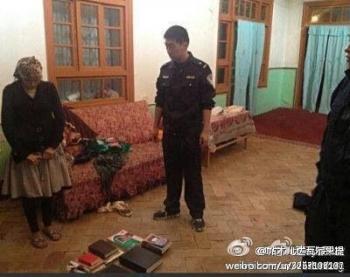UHRP Expresses Concern About Reports of Quran Confiscations in East Turkestan

For Immediate Release
September 29, 2017 12:10 pm EST
Contact: Uyghur Human Rights Project +1 (202) 478 1920
The Uyghur Human Rights Project (UHRP) is concerned about recent media reports on the confiscation of Qurans and prayer rugs from Uyghur, Kazak and Kyrgyz residents of East Turkestan.
On September 28 Radio Free Asia reported that Qurans are among the illegal religious items residents have been ordered to turn into the authorities, along with prayer rugs, other religious books and items with the crescent and star symbol of Islam. This is the latest escalation of repression of religious expression in East Turkestan by the Chinese authorities, where there has been a documented worsening in the rights of Uyghurs to practice their faith.
In May of this year reports emerged local governments in towns near Kashgar were confiscating all Qurans published before 2012, including ones from government printing houses. Even these official versions had issues with “some signs of extremism,” according to authorities, though what those issues were is unclear. A new official Uyghur translation of the Quran had been published in 2012, but media reports quote locals saying the holy book has been pulled from store shelves and is under government review. This is despite the most recent government white paper titled “Human Rights in Xinjiang- Development and Progress” boasting of the number of Qurans and hadith collections the government has translated and published.
“By conflating the holy book of Islam with extremism, the Chinese authorities are alienating Uyghurs and other Muslim ethnic groups,” said Omer Kanat, the director of the Uyghur Human Rights Project. “The authorities’ believe that possession of a Quran is a sign of separatist sympathies, and their solution is to attempt to eliminate the practice of Islam from the peoples of East Turkestan.”
These policies are some of the most repressive towards religious expression since the Cultural Revolution, when Red Guards attempted to extinguish the “Four Olds.” This latest campaign is also deeply ideological, as the authorities appear to have concluded that the religious element of Uyghur identity is inherently threatening to stability and their control. It is not only physical Qurans that the authorities object to; it was reported that a young Uyghur woman was detained for reposting Quranic passages and devotional material on social media, while a Hui resident of East Turkestan was imprisoned for organizing an online Quran study group. Audio and text based apps of the Quran have become popular in the Muslim world, but for the past few years the Chinese authorities closely monitor Uyghur phones for audio files and apps with religious content, deleting them when found and detaining those found trying to access religious content online. Even Arabic pop songs have been deemed too sensitive, according to some university students in Kashgar quoted by the LA Times.
For years the Chinese authorities have been imprisoning people for organizing their own study and discussion of the Quran outside of government control. Now this infringement on religious freedom is extending to Uyghurs’ rights even to read the Quran. UHRP calls on the Chinese government to respect laws protecting freedom of religion inscribed in its own constitution and in the Universal Declaration of Human Rights and the International Covenant of Civil and Political Rights.
See Also:
Sacred Right Defiled: China’s Iron-Fisted Repression of Uyghur Religious Freedom
Freedom House- The Battle for China’s Spirit: Islam
https://freedomhouse.org/sites/default/files/FH_2017_BattleForChinasSpirit_Islam_0.pdf
